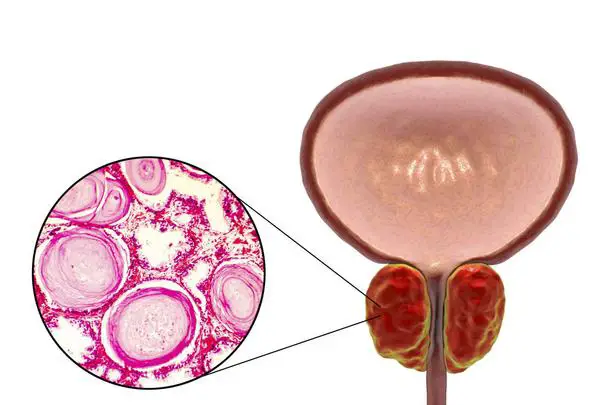Prostate is a male muscular gland that surrounds urethra. It secretes a fluid which is one of the components of seminal fluid that nourishes sperms. Also, it’s believed that prostate gland plays a vital role during ejaculation thanks to its muscular structure.
What is benign prostatic hyperplasia?
In some men, prostate may undergo enlargement; this occurs due to massive multiplication of the prostate gland cells, leading to swelling of the gland, which in turn apply a pressure over the urethra and interfere with urine flow through urethra. It should be noted that benign prostatic hyperplasia and prostatic cancer aren’t the same; it’s benign tumor although both may be manifested initially with the same clinical picture (prostate cancer usually tends to be asymptomatic).
Causes of benign prostatic hyperplasia
Although the exact cause of benign prostatic hyperplasia is unclear, aging seems to be one of the most significant predisposing factors of the disease (more common in men over 50 years old), which is attributed to hormonal changes that usually occur during this age stage and affect the functional status of prostate gland. On other side, men with positive family history of prostate problems in general are at a greater risk to develop benign prostatic hyperplasia.
Symptoms of benign prostatic hyperplasia
Symptoms of benign prostatic hyperplasia tend to be progressive; they mainly occur due to hypertrophy of the prostatic tissue which applies a massive pressure over the urethra; the most significant symptoms include the following:
- Dysuria; difficulty to urinate or painful urination.
- Hematuria; blood in urine.
- Frequency; repeated urination.
- Urgency; sudden desire to urinate.
- Nocturia; frequent urination at night after going bed.
- Urinary incontinence; uncontrolled leakage of urine.
- Incomplete emptying of the bladder during urination.
If you have one or more of the above mentioned symptoms, it’s advised to see a doctor for proper assessment.
Complications of benign prostatic hyperplasia
Untreated or neglected cases of benign prostatic hyperplasia may lead to exacerbation of the symptoms as well as development of some serious complications, such as:
- Recurrent urinary tract infection.
- Urinary stones.
- Urine retention.
- Hydroureter or hydronephrosis, which may end with acute or chronic renal failure.
Diagnosis of benign prostatic hyperplasia
Initial diagnosis of benign prostatic hyperplasia consists of clinical examination, checking medical history and assessment of the presenting symptoms. It should be noted that clinical examination includes applying rectal examination (PR) which allows the doctor to check prostate gland and find out its shape, texture and size.
On the same context some investigations and procedures may be performed to confirm diagnosis, they include the following:
- Urine analysis: to detect bacteria, pus or blood in urine.
- Urodynamic study: it aims mainly to measure pressure inside urinary bladder during urination.
- Post-void residual study: it measures the amount of urine left in the cavity of urinary bladder after full urination.
- Cystoscopy: it’s an important diagnostic tool that helps in taking a close look inside the urethra and urinary bladder.
- PSA test: it is lab investigation that is used to exclude prostate carcinoma.
Treatment of benign prostatic hyperplasia
There are many therapeutic lines and options for proper management of benign prostatic hyperplasia; they include the following:
- Life style modifications, such as:
- Determination of specific times to urinate, even if you don’t feel urge.
- Avoiding excessive intake of caffeine drinks, as they have diuretic effect.
- It’s preferred to limit the intake of fluids (even water) 2 – 3 hours before bedtime.
- Doing Kegel exercise regularly, as they strengthen muscles of pelvic floor, which plays an important role in the mechanism of urination.
- Medications, they include: hormonal treatment, antibiotics and alpha-1 blockers (help in relaxation of muscles of urinary bladder and prostate).
- Embolisation is one of the newest treatment choice in Turkey.
- Surgery: it’s recommended in advanced cases or in case of failure of drug therapy. Surgical options include total or subtotal prostatectomy.

